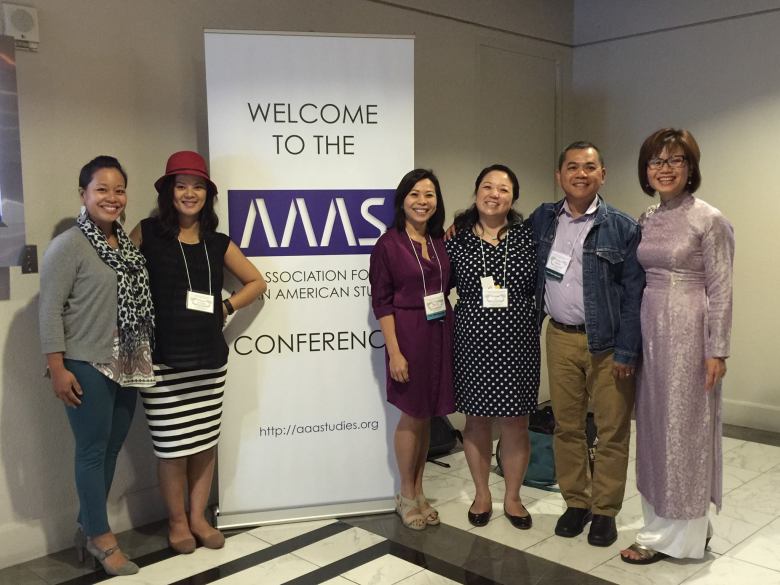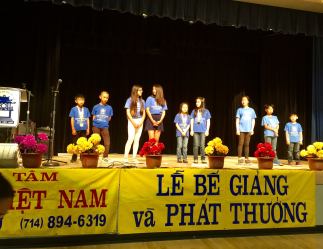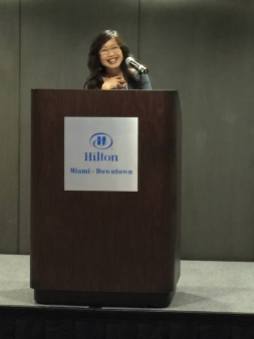This past Memorial Day 2016, we as a nation, took pause to honor the men and women who served in the military to protect our country’s freedoms and democratic way of life.
But refugee immigrants (who fled war, violence and tyranny), are also acutely aware of the ultimate price of ‘freedom’ because we, at some point in our lives, were also willing to pay with our lives, to be free, in order to live with dignity.
Also this past month of May, we celebrated Asian-Pacific-Islander-American Heritage Month (#APIAHM), as well as raise Mental Health Awareness (#APIAMHAM). Specific to our soldiers as well as to the refugee survivors of war, we are alerted to the immense impact that not only fighting the wars–but surviving its collateral damages afterwards–have specific impact on our personal and our collective ethnic communities’ mental health.
Within the monumental context of your recent historic trips back to my birth homeland of Việt Nam AND then to Hiroshima, Japan to ‘bury the relics the Cold War and World War II” of the 20th century, there is so much to comment on the State of our API-America (APIA) as part of this great Union. While there is no doubt that vast #Hope and #Faith that #Change has come to Asia-Pacific-Islander America and to Vietnam since the end of the VietnAmerican War, the harsh reality is that we have yet, a far ways to go.
In this open letter to you, I want to reflect on the events of the last 2 months, as well as put out a challenge to you: to remain ever-vigilant in protecting our precious freedoms of speech and expression in your encouragement of the arts and Ethnic Studies to propel not just Vietnam and the world, but also multi-cultural America #Forward.
For this is how I will be able to explain to my six year-old, American-born son, (when he comes of age) the gravity of these sweeping changes that have occurred in the last forty-one years. Over four decades ago when the Vietnamese communist tanks rolled into Saigon, I will tell him of how his mother at his same age of six years old (along with her parents’ family six-pack and over 125,000 Vietnamese refugees, involved with the losing Nationalist government of South Vietnam) were sent fleeing, into the Diaspora with the U.S. military’s evacuation called Operation Frequent Wind on April 29, 1975.
How do we as bipolar Vietnamese-Americans reconcile our vast pride that you, our beloved 21st century, mixed-race American President of the United States (#POTUS) Obama had the “audacity” to come make peace in May 2016, bringing his special brand of #Hope and #Change to nudge our current-day repressive, communist birth country of VietNam to move #Forward?
It will help me to explain this to my boy, by referencing your beat-box with 26 year old transnationalized female Việt rapper, Suboi, in Ho Chí Minh City on May 25, 2016. Here, once again, you proved that you can continually keep #Hope alive by reminding the Việt young folks in that faraway town hall that by insisting for fundamental freedoms of speech and artistic expression of artists and the press to flourish, they can #BetheChange agents to transform their government to becoming a stronger, civil(ized) society.
Years from now, when my 6 years old son grows up to be a man, I will surely replay for him Suboi’s bilingual beatbox rap to you (she was the last YSEALI to pose a question at minute 57:57):
“As artists, we have a lot to say. I want to know how important it is for a nation to really help and promote their art and culture, to help [our] nation in the future.”

Your profound impromptu response remains equally inspiring (at minute 1:00:04):
“Artistic expression is important: Music, poetry, representations of life as it is, and how it should be…those are things that inspire people. The most important thing about art is that it teaches you , and puts you in the head of other people so that you start realizing about someone else’s pain, or someone else’s hopes. You start realizing that we have more in common…
If you listen to a Vietnamese [woman’s] rap, it may connect to how I am feeling… and now, I feel closer to another country on the other side of the world. And that’s how we end up coming together, to build a better future together, for each other…
But look. Let’s be honest. Sometimes art is dangerous though. And that’s why governments get nervous about art. But one of the things I truly believe that if you try to suppress the arts, you suppress the deepest dreams and aspirations of a people. One of the greatest things about the U.S. is–for all our flaws in a lot of areas–we do give opportunities for greater expression… And something like rap, that started off as an expression of poor, African-Americans, has become a global phenomenon, and the art form of young people around the world today…
You gotta let people express themselves! That’s part of what a modern, 21st century culture is all about.”
And so just as we Americans experienced in 2008 and again, in 2012 (when you won both your epic, historic elections), Obamania has swept through Hanoi and HCMC. How do I know? Because in both those historic years, I took time out of my full-time private medical practice, took red-eye flights from the OC to our nation’s Capitol. I managed to negotiate the massive crowds from the airport, to the DC subway and arrived, just in the nick of time on the National Mall, to congregate with millions of fellow Americans (from all walks of life, every ethnicity and across the age-spectrum) to watch you take your sacred oath of office.

Two dedicated moms: Dr. Mai-Phương (and her 2 year old boy, Nam-Uy, from Napa, CA), and Portia (with her 16 y/o son, AJ, from Atlanta, GA) shared a 45 minute tuna-can-packed metro subway ride, walked 1 hour along Independence Avenue, from the subway onto the National Mall, enduring blistering cold weather, to bear witness to the Obamas’ 2nd inauguration.
Both times, I witnessed first hand and participated in that tide of ebullient fellowship, overflowing with #Hope #Faith for #Change. And so today, once your “magic dust” settles across my former homeland, and upon your return to the White House across the oceans, I want to bring us back to the state of our Union, here in API-America in 2016.
Whereupon, on May 22, 2016, my 6 year old son graduated from his first year of the equivalent of Vietnamese Sunday school kindergarten at the local Trung Tâm Văn Hóa Việt Nam (Center for Vietnamese Culture) in the heart of Little Saigon, in Orange County, California.
At said ceremony in the gymnasium of Warner Middle School in Westminster, California, the dignitaries that came to speak were Westminster Vice-Mayor, Sergio Contreras, and Westminster School Board Member, Jamison Power. Both greeted the audience of about 500 parents and families in Vietnamese. In the case of Vice-Mayor Contreras (who is of Mexican descent), he spoke in full sentences, with proper Việt diction and (5 tonal) diacritics–such that if I closed my eyes, I would not have known that he was NOT a native Việt speaker!
As a first generation child refugee, now a middle-aged parent of a toddler, I cannot express to you the depth of my gratitude for the life that my son now has, as an American-born Vietnamese, growing up in a much more nuanced and multi-culturally cognizant America. THIS is indeed progress! Through the massive sacrifices of his grandparents, who boldly and unflinchingly suffered anything and everything thrown their way, as refugee immigrants in 1975, to behold that magnificent ceremony at Warner Middle School, with our culturally and linguistically-competent local leaders was beyond my imagination.
Forty one years ago, there were no such Sunday school Vietnamese language programs when I was growing up in Fairfax, Virginia, in a new final asylum country. America in the late 1970s was in many ways, an exceedingly generous country. However, in other ways, America was a hurtful, hateful country whose traumatized, fearful Eurocentric mainstream Americans treated us new refugee immigrants from a former ‘enemy’ country, in less-than-kindly manners.
So in commemoration of Memorial Day 2016, I want to bring to your awareness the state of Asian-American and Ethnic Studies here, in the USA. I trust you are keenly aware of the “bamboo ceiling” that still exists throughout our country. That is due to the terribly dangerous “Asian-Model Minority Myth” (i.e. the faulty notion that “all Asian-Americans do better in the USA,” compared to other marginalized or disadvantaged, ethnic minorities like Black, Latino and Native Americans). Because of this Model-Minority Myth,we API-Americans, have limited employment promotions and leadership opportunities. We refuse to be “the wedge” that divides our beautiful mosaic, as a nation of immigrants.
This “bamboo ceiling” is ever more prevalent among API-Americans in academia. Currently, there is a groundswell of student activism across the nation in protests against the incredible institutionalized racism that is preventing the proper establishment, funding and maintenance of Asian-American/Ethnic Studies programs.
At elite Ivy League universities such as Harvard, Yale, Dartmouth and Brown, there are high-profile lawsuits being filed over race-conscious Anti-Affirmative Action complaints. Similarly, in public colleges educating young people from lower-income or more disadvantaged socio-economic strata such as City University of New York (CUNY) and Hunter College in NYC, the students are learning efficacious, modern ways of community-organizing. They are mobilizing fellow students, faculty and communities at large. They are also waging sophisticated, inter-collegiate social media campaigns using contemporary tools like Twitter, FB and Skype-conferencing “To Fight the Tower!” This proverbial “Tower” historically then and now, continues to deny them (and all of us) access to Asian-American and Ethnic Studies as well as deny highly qualified Asian-American professors tenure.
So in similar vein, as you have encouraged on the world stage in Vietnam last week: Calling upon young people, aspiring leaders and artists (such as Suboi) alike, to stay vigilant and speak their minds, and push through the fears of being incarcerated, beaten and tortured, to continue creating their art. I am asking for your continued, vigilant support of the plight of students in America who yearn for diverse and culturally-competent higher education.
I hope you will hold accountable, the powers that be, to end the covert and overt institutionalized racism that continues in our America. I trust by now, you are aware that well-qualified and widely popular scholars like Dr. Aimee Bahng of Dartmouth College, are being denied tenure by her department chairs and promotions committees, despite meeting all the rigorous requisites of her English and American Studies departments.
And lastly, I want to leave you with the inspiration of dedicated, young Filipino-American leaders like California State University Fullerton, Class of 2016 cum laude Titan, Anthony James Villanueva. In his moving graduation speech on May 21, 2016, Anthony spoke from the heart and gave a compelling testimonial to the import, urgency and value of Asian-American/Ethnic Studies.

At minute 5:59: Anthony profoundly confesses,
“Ethnic Studies taught me to love–the person to my right and left; love for those who’ve come before us; and love for the folks in the very same seats that we are in today.”
To paraphrase, Anthony attributes Ethnic Studies to helping him 1) discover his family’s cultural history and roots, 2) find his voice and his life’s purpose meanwhile challenging him to give back by #PayingItForward through mentorship at the Orange County Asian Pacific Islander Community Alliance (OCAPICA). Throughout his speech, he credits his CSUF faculty adviser and mentor, Dr. Tú-Uyên Nguyễn, MPH, PhD, for challenging him and nudging him towards finding his true calling to serve (“always with a plate of food in hand, in true APIA fashion”).
The irony is Dr. Tú-Uyên Nguyễn and I were student activists at UCI-Irvine in the 1990s. There, we tested our mettle and learned community organizing skills through our refugee advocacy with an idealistic organization called Project Ngọc, during the height of the Vietnamese Boat People crisis. This was during a time when compassion fatigue had set-in, and the world wanted to close the refugees camps and repatriate the Vietnamese back to the terrifying homeland they risked everything to flee.
I served as Project Ngọc’s Co-Chair from 1989-1991. (Back then, I could barely string sentences together in my mother tongue.) Dr. Tú-Uyên joined Project Ngoc two years later. The summer after her freshman year, she served on a Project Ngọc fact-finding mission throughout the SE Asian refugee camps, collecting valuable information about the impact of the overcrowded, dilapidated camps on unaccompanied minors. Back in those days, Asian-American and Ethnic Studies did not exist at UCI.
Through galvanizing student protests (via letter writing campaigns, sit-ins, hunger strikes, civil disobedience, etc.) locally, nationally and internationally, we successfully fought for the establishment of Asian-American and Ethnic Studies at UCI for posterity. Also through these leadership-building activities, we found our voices, our missions and our paths to serve. These precious, life-changing student organizing and leadership-building engagements changed the trajectory of our personal and professional lives.
In fact, these very activities are rooted in the origins of Ethnic Studies which mushroomed during the 1960s’ Civil Rights Movements. Today, there is a robust Asian-American Studies program and a world-class Orange County SE Asian Archives (OC-SEAA) at our alma mater, UCI. The growth of both the Asian-Am programs and the OC-SEAA was in large part due to the fierce work we students accomplished together, almost three decades earlier. In more contemporary times, the UCI-Asian-Am/Ethnic Studies departments have grown in leaps and bounds, thanks to the tireless leadership of academic-warriors like Professor Linda Trinh Võ, PhD. Through skillful grassroots, community-based organizing and negotiating “The Tower,” Professor Võ garnered her milestone, full professorship in 2016.
In Việt-Am culture, there is a deep-rooted concept of “duyên” or karmic connectivity. (Whereas, American culture would perhaps label it as happenstance “irony.”) Ironically, or karmically, Dr. Võ also just recently stepped down as AAAS’ immediate past president. At their Annual AAAS Awards Reception, Dr. Võ eloquently commented on April 30, 2016, (exactly 41 years after Saigon fell) that it was nothing short of a miracle: that a little girl born in war-torn, rural Vietnam would grow up in America, to fulfill her life’s dream and mission. She became a scholar and was privileged to serve as the president of the national Association of Asian-American Studies.
Also karmically (or ironically), at said AAAS conference in Miami, I would meet Anthony James Villanueva and many other brave Asian-American students throughout the nation who are leading the way to a “more perfect Union” — one in which there will be Asian-American/Ethnic Studies departments that are fully funded and adequately staffed by qualified professors who can teach them culturally-competent, relevant ethnic histories. Histories and lessons yet to be learned from the legacies of Hiroshima, the VietnAmerican War, Boat People refugees exoduses of yesteryear and today, human rights violations, etc.
Because by learning their relevant past and contemporary histories, they will garner key tools and skills they will need to discover themselves, gain self-confidence, become empathetic and responsible leaders, and find their true purposes in life.
For indeed this is the prescriptive our nation needs, to battle the bi-model overwhelming statistics of depression, anxiety, PTSD running rampant among 2 subsets of Asian-Pacific Islander American communities at highest risks for suicide: the youth from 15-24 years of age and elderly women older than 65 years. #APIAMentalHealthAwarenessMonth.
And “How? you ask, do I know these facts to be true?” I speak with authority because, firstly, I was among the first group of victims of the APIA Model-Minority mythic youth from 22 to 45 years of age, who struggled for over twenty years with severe bouts of chronic depression, anxiety and suicide. I also endured decades long culturally-inappropriate, but well-intended mental healthcare, as a result of my childhood (compounded with my young adulthood) Post-Traumatic Stress Disorder (PTSD) being unrecognized and undiagnosed. Secondly, because now as a recovered, healthy physician who specializes in care for seniors, I attend to mostly aging APIA elders. In particular, I work with Vietnamese-Americans in Little Saigon, Orange County, who suffer rampant ravages (and as we say in this business) “collateral damage” of remote war and unresolved trauma.

UCI-contingency attending AAAS on April 29, 2016 (from left to right): commissioned artist Trinh Mai for UCI-VAOHP’s (40th Anniversary of Fall of Saigon) 2015 Viet-fOCus (#IamOC) Art Exhibit; Thúy Võ-Đặng, PhD aka OC-SEAA archivist; Tú-Uyên Nguyễn, PhD, MPH, professor of CSUF Asian-Am Studies; Trâm Lê, Project Director of UCI’s Vietnamese American Oral History Project (VAOHP); Emmy winning filmmaker Đức Nguyễn; and Mai-Phương Nguyễn, MD, minority healthcare advocate.
On this Memorial Day 2016, Mr. President, we stand united with you, to pay tribute to all those who have served, sacrificed, passed away and/or passed onto us this ever precious family heirloom pearl (aka ngọc), worth dying for, called democracy. “Let Freedom ring!”
Mai-Phương T. Nguyễn, MD, is a resident of Fountain Valley and founder, CEO and Doctor-preneur of Karuna-Healthcare
Opinions expressed in editorials belong to the authors and not Voice of OC.
Voice of OC is interested in hearing different perspectives and voices. If you want to weigh in on this issue or others please contact Voice of OC Involvement Editor Theresa Sears at TSears@voiceofoc.org


